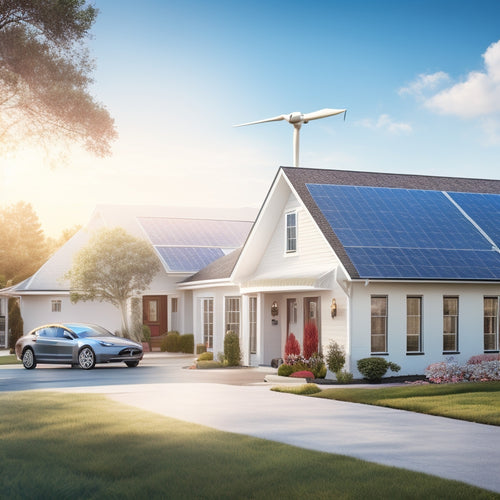
Reducing Solar Energy Cost for Your Home
Share
You can reduce the cost of solar energy for your home by understanding solar energy pricing, choosing the right solar panels, and optimizing your system size. With advancements in technology, solar panel efficiency has increased, leading to lower costs. You can prioritize high-efficiency panels and assess your energy needs to right-size your system. Additionally, exploring financing options, government policies, and local incentives can help. By evaluating your energy usage, embracing lifestyle changes, and leveraging available incentives, you can maximize energy efficiency gains. Now, take the next step to access the full potential of solar energy for your home.
Key Takeaways
- Understanding solar energy pricing helps identify cost-effective options, with a focus on cost per watt and market trends.
- Choosing high-efficiency solar panels with a good warranty and durability can reduce overall system costs and increase energy generation.
- Right-sizing a solar system through load calculations and system sizing analysis prevents over- or under-producing energy, optimizing resource use.
- Federal and state incentives, such as tax credits and rebates, can significantly reduce upfront solar system costs, making it more accessible.
- Regular performance monitoring and data analysis help identify inefficiencies, allowing for adjustments to optimize system performance and maximize energy savings.
Understanding Solar Energy Pricing
Reducing Solar Energy Cost
Understanding Solar Energy Pricing
Frequently, homeowners and businesses alike are drawn to solar energy as a cleaner, more sustainable alternative to traditional power sources, but the upfront cost can be a significant deterrent.
You're likely aware that the cost of solar energy has decreased over the years, making it more accessible to a wider range of consumers. However, it's vital to understand the factors influencing solar energy pricing to make an informed decision.
Solar market trends play a significant role in determining the cost of solar energy. As demand increases, manufacturers are incentivized to produce more efficient and cost-effective panels, driving prices down.
Additionally, advancements in technology have led to improved panel efficiency, further reducing costs. Pricing models, such as the cost per watt, help you compare prices across different manufacturers and installations.
Choosing the Right Solar Panels
When selecting solar panels, you'll want to contemplate two critical factors: efficiency and quality.
Efficiency, measured by the percentage of sunlight converted to electricity, affects how much power you can generate per unit area.
Solar Panel Efficiency
About 20% of the total cost of a solar energy system goes into the solar panels themselves. When choosing the right solar panels, you want to guarantee you're getting the most efficient ones for your money.
Solar panel efficiency refers to how well a panel converts sunlight into electricity. You'll want to look for panels with high efficiency ratings, typically above 18%.
Thanks to solar technology advancements, modern panels are more efficient than ever. However, panel degradation factors like temperature, shading, and aging can affect efficiency over time. To mitigate this, consider panels with built-in temperature control or those designed to perform well in low-light conditions.
When evaluating panel efficiency, also consider the wattage per square foot. Higher wattage panels can generate more power in a smaller area, making them ideal for homes with limited roof space.
Panel Quality Comparison
Frequently, homeowners find themselves overwhelmed by the numerous options available in the solar panel market. When choosing the right solar panels for your home, you'll want to take into account various factors that impact their quality and performance.
| Brand | Warranty | Durability |
|---|---|---|
| Panasonic | 25-year performance guarantee | High-temperature resistance, corrosion-proof |
| LG | 25-year performance guarantee | Waterproof, UV-resistant |
| Trina | 25-year performance guarantee | Anodized aluminum frame, weather-resistant |
Beyond warranty and durability, you should also take into consideration aesthetic options, installation techniques, and brand reputation. Look for technology advancements that improve energy efficiency and reduce environmental impact. A cost-effectiveness analysis will help you weigh the upfront cost against long-term savings. Additionally, inquire about performance guarantees and recycling options. By evaluating these factors, you'll be able to make an informed decision that meets your energy needs and budget.
Optimizing Your Solar System Size
When optimizing your solar system size, you'll need to assess your energy needs to determine how much power you require.
Right-sizing your system guarantees you're not over- or under-producing energy, which can lead to wasted resources and increased costs.
Assess Your Energy Needs
To optimize your solar system size, you must first determine your energy needs. This involves analyzing your energy consumption patterns to identify areas of high demand.
Start by reviewing your past electricity bills to understand your average daily energy usage in kilowatt-hours (kWh). You can also use online tools or consult with a solar professional to conduct a thorough cost analysis.
Next, identify the appliances and devices that consume the most energy in your home. This could include refrigerators, air conditioners, lighting systems, and electric water heaters.
Calculate their individual energy usage and prioritize them based on their consumption levels.
Right-Sizing Your System
Now that you've assessed your energy needs, you're ready to determine the ideal size of your solar system. Right-sizing your system is essential to maximize energy production while minimizing costs. A system that's too small won't meet your energy demands, while one that's too large will waste resources.
To get it just right, you'll need to perform load calculations, which involve analyzing your energy usage patterns and identifying the peak demand periods. Your solar panel professional will use specialized software to conduct a thorough system sizing analysis.
This process takes into account factors such as your roof's size and orientation, local building codes, and the type of solar panels you've chosen. The goal is to determine the best system size that meets your energy needs while considering your budget and available roof space.
Energy Efficiency Gains
Optimizing your solar system size through energy efficiency gains can greatly reduce the overall cost of your solar energy investment. By implementing energy-saving measures, you can reduce your energy consumption, allowing you to install a smaller solar system, which in turn reduces the upfront cost.
| Energy Efficiency Measures | Benefits |
|---|---|
| Energy Audits | Identify areas of energy waste and opportunities for improvement |
| Smart Thermostats and Insulation Upgrades | Reduce heating and cooling energy consumption |
| Energy Efficient Appliances | Lower energy consumption from appliances and lighting |
| Passive Solar and Home Automation | Optimize energy usage through automated controls and natural lighting |
Maximizing Energy Efficiency Gains
Several factors contribute to the overall efficiency of a solar energy system, and understanding these factors is essential to maximizing energy efficiency gains.
You can optimize your solar energy system's performance by focusing on energy conservation and sustainable practices.
To get started, consider conducting energy audits to identify areas of energy loss in your home. This will help you prioritize insulation upgrades and other energy-efficient improvements.
By incorporating smart technology, you can monitor and control your energy usage in real-time, making adjustments as needed.
Some key strategies for maximizing energy efficiency gains include:
- Adopting lifestyle changes, such as turning off lights and appliances when not in use
- Exploring financing options and government policies that support renewable energy adoption
- Participating in community programs that promote energy conservation
- Embracing sustainable practices that reduce your reliance on non-renewable energy sources
Incentives and Tax Credit Benefits
Frequently, homeowners and businesses overlook the considerable financial benefits that come with investing in solar energy systems. You can considerably reduce the cost of solar energy for your home by taking advantage of various incentives and tax credit benefits.
| Incentives | Description |
|---|---|
| Federal Incentives | 26% tax credit on total solar energy system cost |
| State Credits | Varying credits and rebates offered by individual states |
| Local Rebates | Utility company and local government rebates and incentives |
| Financing Options | Solar loans and grant programs for financing solar energy systems |
| Tax Deductions | Additional tax deductions on interest paid on solar loans |
These incentives can considerably reduce the upfront cost of solar energy systems, making them more affordable for you. Additionally, you can benefit from investment returns through increased property value and reduced energy bills. By taking advantage of these incentives, you can enjoy the benefits of solar energy while minimizing the financial burden.
Reducing Installation and Maintenance
Nearly 70% of the total solar energy system cost is attributed to installation and maintenance expenses. As you consider reducing the cost of solar energy for your home, it's crucial to focus on minimizing these expenses.
You can start by investigating DIY installation options, but keep in mind that this approach may require significant time and knowledge. Alternatively, you can opt for solar leasing, which can reduce upfront costs but may also diminish the overall savings.
To reduce maintenance expenses, consider the following:
- Research local incentives and community programs that offer discounted installation rates or maintenance services.
- Look for contractors who offer equipment warranties and thorough maintenance tips.
- Confirm your installation timeline is reasonable and aligns with your energy audit schedule.
- Investigate financing options that incorporate maintenance costs into your monthly payments.
Monitoring and Adjusting Performance
Your solar energy system's performance is only as good as its monitoring and adjustment. To get the most out of your investment, you need to keep a close eye on its operation. That's where monitoring tools come in.
These tools provide real-time monitoring of your system's performance metrics, allowing you to identify areas for improvement. By analyzing the data, you can pinpoint inefficiencies and make system adjustments to optimize energy production.
Performance analytics help you track your system's efficiency, identifying trends and patterns that inform optimization strategies. With data analysis, you can refine your system's performance, ensuring it runs at peak efficiency.
Regular monitoring also enables you to detect potential issues early, reducing downtime and maintenance costs. By staying on top of your system's performance, you can maximize its energy output, reducing your reliance on the grid and saving you money in the long run.
Frequently Asked Questions
Can Solar Panels Be Installed on a Metal Roof?
As you weigh your solar options, you'll find that metal roofs can be a silver lining, offering advantages like durability and wind resistance. However, during installation, you'll need to contemplate specialized clamps and brackets to secure panels to your metal roof.
Will Solar Panels Increase My Property Taxes?
You're wondering if solar panels will increase your property taxes. Generally, they won't, as many states exempt solar installations from property tax implications. Plus, you'll benefit from solar energy incentives, like federal tax credits, which can offset potential increases.
Do Solar Panels Work During a Power Outage?
You're not left in the dark - literally! During a power outage, your solar panels won't generate electricity, but with a home energy storage system, you can store excess energy for later use, maintaining a decent solar panel efficiency of around 20%.
Can I Add More Panels to My Existing System?
You can add more panels to your existing system, but you'll need to guarantee panel compatibility and assess installation costs; consider factors like wiring, inverter capacity, and roof space to determine the feasibility of an upgrade.
Will Solar Panels Void My Roof Warranty?
You're maneuvering a delicate dance, where solar panels and roof warranties entwine like ivy on a trellis. Typically, installing solar panels won't void your roof warranty, as long as the panels are installed correctly and compatible with your roof material, ensuring a harmonious 25-year solar panel longevity.
Related Posts
-

Top 10 DIY Conversion Kit Reviews and Tips
You're taking the first step towards electrifying your ride, and with the right DIY conversion kit, you'll be cruisin...
-

Why Homeowners Are Embracing DIY Energy Independence
By taking control of your energy needs, you're breaking free from the uncertainty of utility bills and embracing a se...
-

Safely Staying on Course: 5 Essential Lane Tips
You're about to take your driving skills to the next level by mastering the art of staying in your lane. First, inves...


